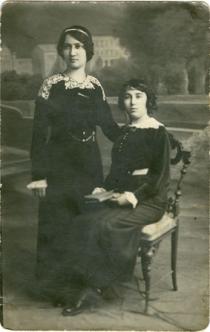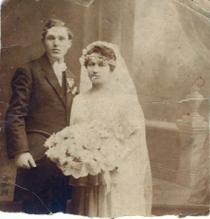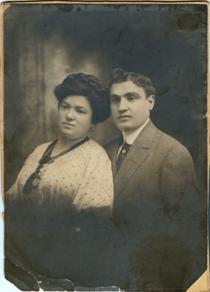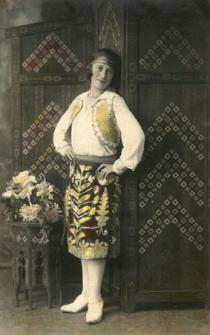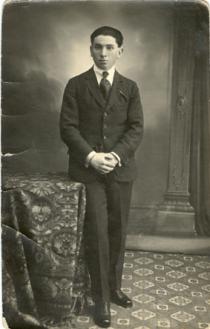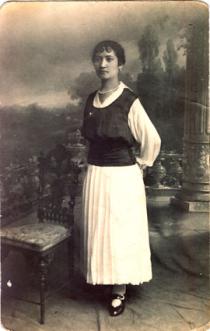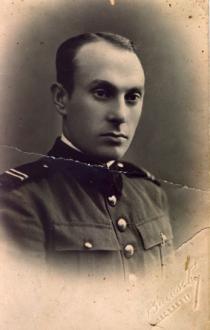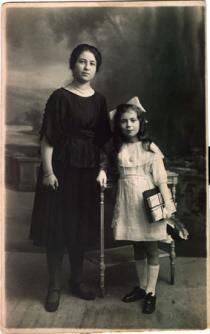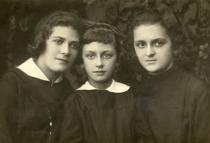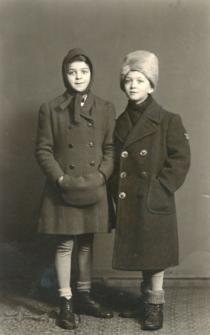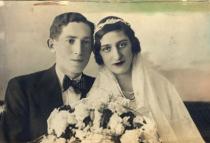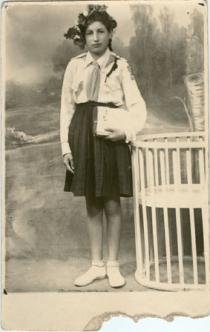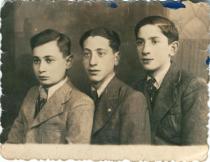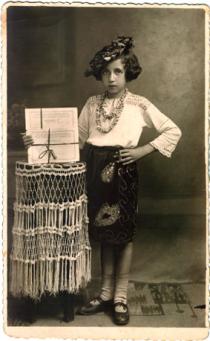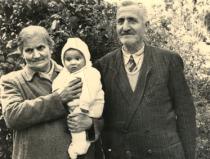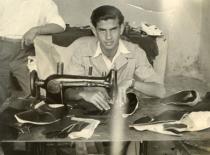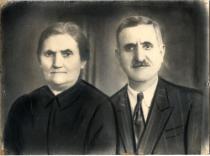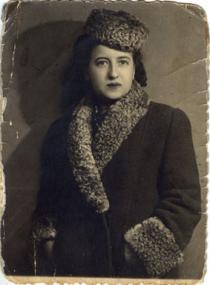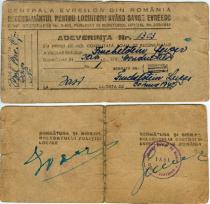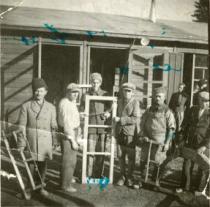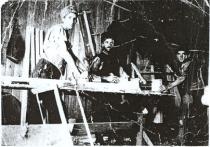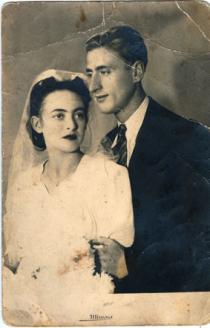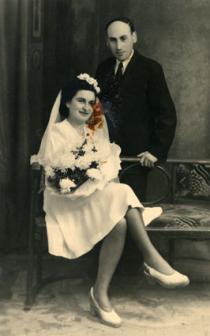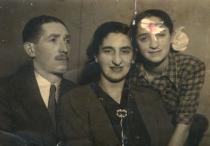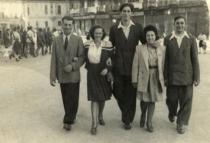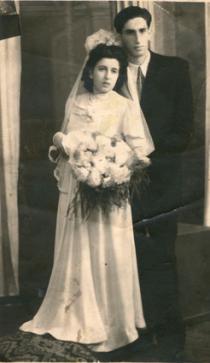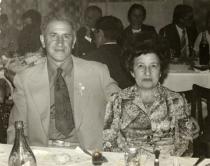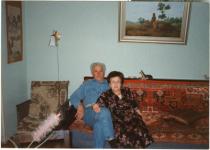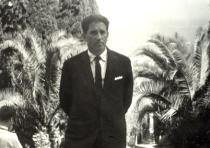
Leizer Finchelstein
Iasi
Romania
Francisca Solomon
November 2006
Mr. Leizer Finchelstein is 83 and is a very active, cheerful, and outgoing person. He is very tall and his hair is white. He goes to the Jewish Community every day and is still helping his friends and acquaintances with various carpentry repairs. He is living together with his wife in a two-room apartment, decorated modestly. He appeared to be very excited during the interview. He took great pleasure in remembering certain childhood episodes: the love with which the parents raised their 9 children, the very tight bonds between brothers, or the Jewish traditions and customs observed at home. The questions regarding the war period had a very profound effect on him, and he found it very difficult to recount his experience on the “death trains” during the Iasi pogrom of 29th-30th June 1941.
My family background
The name of the grandfather from my mother’s side was Sloim Vaserman, I believe he was born in Iasi and was a stove fitter. Formerly, all people had wood stoves in their homes, and he was a great specialist in those corner, bricklaid stoves. People built very beautiful stoves in those days. Erecting that system for the evacuation of the smoke was a science in itself. Some landlords would come to pick him up from home by dogcart. On many occasions, they accepted that my grandmother accompany him as well because my grandfather ate only kosher food. My grandmother cooked kosher food for him there so that he wouldn’t have to eat food that wasn’t kosher, but he wouldn’t even eat food that wasn’t kosher. The grandfather from my mother’s side wore a beard. That’s all I remember, we were still little and so many years have passed since then. I remember how we, the children, used to pull his beard when he called on us. He spoke Yiddish at home, but he knew Romanian as well. I don’t remember if my grandfather had any brothers or sisters. My grandfather died in Iasi in the 1930’s.
I can’t offer too many details about the grandmother from my mother’s side, both grandmothers died when I was very little and I barely remember their face. I remember that her name was Sura and I am sure that she was a good grandmother, that’s what the older brothers confessed. I think my mother said that my grandmother resembled her perfectly, as if they were twin sisters, not mother and daughter. Both grandmothers are buried in Iasi in the Jewish cemetery in Pacurari.
My mother had 2 other sisters and 3 brothers. The brothers left to England at a certain point, to Manchester, I don’t remember their names, nor what they did there for a living. From what I heard tell in the family, they didn’t leave together at the same time, first one, then the other followed him. However, my mother’s sisters stayed in Iasi. I remember aunt Pesl and aunt Sura, I forget their family names. Aunt Sura was divorced. She was married with a Jew from Bulgaria who, for reasons unknown to me, left her and vanished. Aunt Sura had 2 children, they were approximately the same age as me. One of the cousins died during the Podu Iloaiei pogrom 1 and I buried him with my own hands in one of the common burial grounds of Podu Iloaiei. And one of them is now living in Israel. Nowadays we talk on the phone, and when we travel there we are their guests. Aunt Pesl was married to a tailor named Vigder, who had a workshop opposite the Golia Tower [Ed. note: monastery in Iasi], on Cuza Voda St. Aunt Pesl had 2 sons as well, who were born handicapped, they were deaf and dumb, despite the fact they were very intelligent children and physically very sound. They were both killed during the pogrom. Aunt Pesl’s husband had 2 children from a previous marriage, for he had 2 children when she married him.
My mother, Haia Risla, born Vaserman, was born in Iasi. I forget the year of birth, it was around 1890. My mother didn’t go to school; I believe her family gave her a religious education.
I don’t remember anything about the grandmother from my father’s side, not even her name. She died when I was very little. The name of the grandfather from my father’s side was Avrum Finchelstein and he was a tailor of women’s clothes in Pascani. I can’t say exactly when he was born. Back then, people didn’t care much for anniversaries, we never celebrated our birthday in the family. We didn’t have the material means, either, nor was it customary. For instance, it was only after I grew old that I celebrated my birthday. I celebrated my first anniversary at 60, when I retired. Like most Jews back then, the grandfather from my father’s side spoke Yiddish. Many Jews of that generation didn’t even speak any language other than Yiddish. Jews lived in Jewish neighborhoods, they worked together. I can’t offer any details about the brothers or sisters of the grandfather from my father’s side, I don’t recall his having any.
Both grandfathers wore regular clothes, only the very religious Jews from Iasi wore sideburns and always donned a tefillin when they went out. I reckon that in Pascani, the town where my father was born, it was the same. The rest of the Jews wore a tefillin only during the morning prayers at the synagogue. But it was out of the question for my grandfathers to go out bareheaded, they always wore a cap. Whenever we ate over at their place, we had to wear something on our head, even though we were children. The grandfathers attended the synagogue on every Friday, Saturday, and on holidays. The kashrut was observed in the household of both of my grandfathers, but also in my parents’ house.
My father had 2 brothers and a sister. I believe they were all born in Pascani, it was later that they moved to Iasi. The eldest brother’s name was Haim Finchelstein. He had an inn on Abator St. in Iasi. Haim had around 4 children, very close cousins of mine. The second-born was Strul Finschelstein, he was a tailor by trade, and he left to America at a certain point before World War II, probably in the 1920’s. The family used to say that during the time that Strul was doing his military service in Romania, he had an argument with a minor superior, slapped his face a few times and was thus forced to flee the army. He came home and told my father: ‘Dear brother, I will not do my military service in Romania anymore.’ He left to Constanta and boarded a ship there and kept going. My father helped him with some money before he departed. My father’s sister’ name was Hona, she was a housewife like most women in those days. Her husband died, and she was left with a daughter. I regret not being able to remember too much about them. The brothers and the sister saw each other again 52 years later in Israel. My father and Haim, one of his brothers, were living in Israel, and their sister traveled from Romania so that they could meet again. It was probably easier for all 4 of them to meet in Israel rather than in America or Romania. This happened in the late 1960’s. Strul came from America for the specific reason of meeting my father and his sister. Afterwards, it wasn’t long before they all passed away. However, my father’s sister died in Iasi.
My father, David Finchelstein, was born in Pascani around 1884. He was a very smart and learned person. Despite having no studies, he learned to read and write by himself, as he was a self-taught man. He acquired a solid general culture on his own by reading Romanian newspapers, but also Jewish ones. Still, as a boy, my father was sent to the cheder, and he learned Yiddish there. He could read and write perfect Yiddish. He attended only “the small cheder,” there were several levels. He worked as a carpenter in Iasi. I don’t recall my father talking about his period in the army, but I think he did the military service, as Jews were required to serve in the army until 1918-1920.
I don’t know many details about how my parents met. I don’t remember them talking about it at home. I think they got married around 1910. Of course there was a religious ceremony performed by a rabbi. In any case, I can say that in our home the relationship between my father and my mother was very good, in spite of the fact that it was a home with many children, and whenever there are children quarrels may always ensue. In turn, we inherited the spirit of this relationship based on good concord; we got along very well as brothers, but with our spouses as well.
Growing up
We all lived in a modest, very poorly house, like most hoses in the Jewish neighborhoods in Iasi, in fact. There were also some Jews who enjoyed better material means, they lived downtown, but the majority of the population lived in Jewish neighborhoods with no comfort, no running water, no electricity, with a toilet in the courtyard. The gas lamp was lit in the evening, and water was brought from the water pump in the street. Back then, water carrying was considered to be a trade. There were the so-called vosertreger [Yiddish: “water carriers”] who brought water to people’s homes. When we grew up, we brought the water home ourselves.
My mother was a housewife, she raised 9 children. I don’t remember my mother ever going to bed or waking up at the same time as we did. We always went to bed and she stayed up longer, for she still had chores to do. In the morning she got up long before us in order to get us ready for school or work. We always found her where we left her, about the house, doing the chores. And let us not forget that washing machines or other possibilities of making life easier didn’t exist in those days. She washed by hand, we didn’t even have running water. Sometimes, when the material situation of our household was better, mother used to hire a woman to do the laundry. She collected the dirty laundry during a week or two and, if she managed to hire a woman to help her with the laundry, they washed all the laundry and stretched it out to dry in the courtyard. All the courtyards were full of washed laundry. This was during summer, it was harder during winter, when we strung the laundry to dry inside the house. Mother was a very hard-working woman. It was only when the girls were a bit older and could take over some of the household chores, that my father started taking my mother out for a walk, or to the park once in a while during summer. That’s how it was in all households, not only in our home. She was always cooking, back then people ate cooked food at lunch and at dinnertime. Young people nowadays can’t even imagine the kind of life that our mothers led.
Father worked from dawn to dusk so that he could support the entire family. During autumn, the preparations for the winter were taken care of, we were 9 children. Mother began by preserving everything that could be preserved, from plum jam, poultry fat, walnuts, honey, potatoes, garlic. Father couldn’t find work during winter, it was the so-called dead season in construction works. When winter arrived, nobody built anything anymore, people didn’t even strike a nail anymore, which is why you had to have everything prepared, from firewood to beans. Many a time, we ate a few slices of bread with butter and plum jam at dinner, a few walnuts and tea. The teapot was always on the stove. At other times we ate some baked potatoes smeared with a little poultry fat.
Father attended the synagogue on every Friday evening and on Saturdays. Normally, he didn’t go to the synagogue during the week as he was working and didn’t have the time for it. There was no reference about the parnusa [Yiddish with a Romanian influence: earning] in the siddur [Yiddish: prayer book]. Father spoke mainly Yiddish, in fact, my parents only spoke Yiddish at home.
Father had a special talent for recounting everything he read. His brother from America, Strul, often sent him Jewish newspapers from over there. These were some very interesting weekly newspapers, with many articles, some on religion, others on the life of Jews in America. Also, stories and anecdotes about Jewish life were printed. We lived in a courtyard with around 14 other tenants, and it was a delight for all the tenants to gather together on Saturday evening under an acacia tree that was growing in the courtyard, and, as we drank tea, father had to tell stories, read one of the more interesting stories from those newspapers. Father was considered by the neighbors to be one of the most intelligent people of the neighborhood; very many people who had small differences, such as various misunderstandings, quarrels or business problems came to him. In those days, people didn’t go to lawyers, or they went to see the rabbi or an older man about their various disputes, someone who had a renown for knowing how to weigh and solve issues.
We were a numerous Jewish family, but we weren’t very religious. The Sabbath started on Friday, and mother began the preparations for it on Thursday. She went to the market on Thursday, brought home a pair of hens, a few kg of poultry or fish, depending on what we could afford. If father earned more money food was better as well, if he earned less money food was worse as well. But there was no Friday evening on which my father didn’t recite the Kiddush [at table, over a glass of wine]. We never had any sausages or pork meat in the house that weren’t kosher. There was a sausage factory that belonged to one of my father’s customers. It was called Leibovici and it produced kosher sausages. Sometimes we ate some frankfurters with mashed potatoes during the week. There was no holiday when we didn’t have soup, made either from poultry or beef, or fish dishes. As a rule, on Saturday we ate fried fish, soup, sometimes meat, then we had something sweet, stewed fruit or kigl [Yiddish: pudding made from pasta] or sweet beans. Of course, Jewish food was our favorite, especially the one prepared on holidays. If you called on somebody on Saturday and they had some special pudding, you knew that the material situation of the family was somewhat good. My mother had to cook something for Saturday from anything she could find.
My father and the boys went to the synagogue every Friday and Saturday. We observed the kashrut and all Jewish holidays. The fact that we were a family with 9 children, out of which 6 were boys and 3 were girls, plus father and mother, we were 11 in total. Yet one of my mother’s sisters lived with us in the house, aunt Sura. As I have previously said, she had been married to a Bulgarian Jew who left her or disappeared, and she was left to raise 2 children. So we were a team to be reckoned with. Father had to work, he was the only one who earned money in the family, mother was a housewife. I will never forget our parents’ effort to raise us. Back then, conditions were very hard, there was no hot water, no electricity. We all studied by the light of the gas lamp. Water was brought from the water pump and heated on the stove. Our only good fortune was that we lived near the Zisu Herman bathhouse, which was a public bathhouse and, as a carpenter, father sometimes worked at this bathhouse. Thus, we had free entrance to the bathhouse. Father would take the boys to the bathhouse on Friday, the schedule was for men on Friday morning, and for women towards the afternoon. Mother would take the girls then and go with them to the bathhouse as well. We washed in a wooden bathtub at home. My mother heated a large cauldron of water and we, the little ones, would enter the bathtub 2 or 3 at a time, and gambol there. There were no luxury soaps back then. You bought some sort of homemade soap which was sold by the pound, cut a slice out of it and that’s how you washed. Mother prepared changes of clothes for us at the end of the week, we didn’t change our clothes 3-4 times a week like nowadays.
Each holiday had its particularity, each came with various dishes. Mother was glad when holidays were on Friday and Saturday, as these were considered holidays anyway. Thus, mother didn’t have to prepare food for the Sabbath, but for the respective holiday as well. For instance, an entire ceremony was performed on Pesach. It began with cleaning of the house some 2 weeks in advance, walls were whitewashed, beds were aired. Everything was washed. We had a trunk in the attic with special dishes for Pesach, which was lowered, washed and tidied up. The chametz was gathered and burned and people bought matzot. On Pesach, my parents bought unleavened bread baked right there in Iasi. Back then, the unleavened bread wasn’t delivered from Israel. There were a few places in Iasi where they baked unleavened bread. The unleavened bread was wrapped in a mat made from bulrush wickerwork, and every family bought as much as they could afford and depending on the number of family members. Every family prepared the flour for the unleavened bread themselves, the slices of unleavened bread were mashed in a steisl [Yiddish: fulling mill, mortar]. Then, the resulting flour was sieved and used to make latkes [Yiddish: a variety of apple fritters made from unleavened bread flour to which eggs and condiments are added, and which are fried in oil afterwards] or farfelakh [Yiddish: small pieces of unleavened bread dipped in egg and dried in the oven] for soup.
The seder evening was very beautiful in our family. As there were very many of us, we had a 2-3 meter long table and we all sat around the table. Mother and father were seated at the head of the table, where the afikoman was usually hidden. A couple of other families lived in the courtyard where we lived, and they didn’t have any children, so that we invited them over at our place during the seder evening and it was a joy for them to sit at such a table. Mother prepared a cast-iron kettle of potatoes and eating bread was out of the question. Father would conduct the ceremony, he read the prayers in Yiddish. Most of the times, the youngest children recited the MaNishtana, the 4 questions that are asked at the beginning of the seder ceremony. Then we, the children, rejoiced when the Pesach songs were sung, and the atmosphere became more loose and cheerful.
On Rosh Hashanah there was the custom of shaking your pockets clean in the proximity of a watercourse or a pool of water and of symbolically getting rid of your sins. It was called di tasleh [Yiddish: the pockets]. We, the children, played in front of the synagogue, and the boys threw thistle balls in the girls’ hair. We had fun in whatever way we could. We didn’t have toys as I see nowadays in the homes with children. We had toys made from patches and balls made from rags. We were very wretched as children. Our great joy was on Pesach and the autumn holidays when we were bought new clothes. And if father earned well before the holidays, he used to buy new things for all the children and come home in a hackney coach, that’s how laden with luggage he was, from shoes to socks, shirts, clothes for all ages. When I put on new shoes, I used to polish them with shoe polish for weeks on end, even on the soles.
Purim was a special holiday as well. Mother began grinding walnuts about 2 weeks in advance, more than 1,000 walnuts. Back then you didn’t go to the store in order to buy the pastry for the strudel, the thin pastry layers were prepared at home. Strudel was one of my mother’s specialties, followed by hamantashen. Apart from that, every housewife prepared yet another 4, 5 kinds of baked dishes. On Purim, there was the custom of sending one another shelakhmones. Mother sent us, children, with trays of various baked pastries, after which we returned with the trays full of baked pastries we received from our relatives. It was an occasion of great joy for us as we also received Purim gelt [Yiddish: Purim money]. We wore masks on Purim, especially the children and the young. Gypsies knew that we were celebrating Purim and they came to play music. Music filled the air in the entire neighborhood. There were many Gypsy bands that came with trombones and drums in our neighborhood. For us, the children, Purim was one of the merriest holidays. It was when we used to break walnuts, then eat hamantashen.
Chanukkah was another joyous occasion, when we received Chanukkah gelt [Yiddish: Chanukkah money], and mother prepared varnishkes [Yiddish: triangular dumplings with potato or cheese filling]. We went to the shil on Simchat Torah and people were given apples and small flags.
As I have already said, I come from a rather numerous family, a Jewish family of 9 children. We were all born in Iasi, at home, not at the hospital maternity ward. We thank God that we were all healthy and didn’t know what it meant to need a doctor. And I can boast of the fact that we never fought one another, incredible though it may be, but it is true, there were never any arguments among these 9 children. We didn’t even have reasons to argue, we didn’t have separate rooms or toys so that another could take them and start an argument. We shared everything.
My eldest brother’s name was Elisa Finchelstein, he was born around 1910. He went to high school and then attended commerce studies under the evening studies system. He thus became an expert accountant. He worked for various shop owners who needed accounting services. Elisa died in 1964 in a car accident during a holiday at Baile Felix. He went to see Goga’s castle in Ciucea and he was run over by a car as he was crossing the street. He is buried in Iasi.
The second-born was Moise Finchelstein; he was born around 1911. He worked as a clerk in a silk-products store, “Galia.” Liza followed, our first sister, she was born around 1915. Her Jewish name was Lea, her Romanian name was Liza, and the Romanian name of her husband, Mothe, was Marcel. She worked as a dressmaker. Shortly afterwards, they left to Israel illegally through Hungary. In Austria they were welcome by and received the support of Zionist organizations which helped them to continue their journey. They made it to Cyprus and they waited there for almost 2 years until they could enter Israel. They had a macolet [Hebrew], a sort of bakery. She is still alive today, she is over 90 years old. Liza’s husband is no longer alive, they have an only daughter, Braha, who is also living in Israel.
Clara was born in 1916, and Mina was born in 1917. They worked as dressmakers as well.
Iosel Finchelstein was born around 1919. He worked as a carpenter in a workshop together with my father and was killed during the Iasi pogrom in the summer of 1941. He was only 22 at the time. I don’t know where he is buried, probably in one of the common burial grounds. I remember that Iosel often worked with my father for the Yiddish Theatre in Iasi, “Pomul Verde,” and, on many occasions, played as an extra or was given very small parts in the plays that were performed there. [Ed. note: The first professional theatre in Yiddish was founded in Gradina “Pomul Verde” (The “Green Tree” Garden), today the Park in front of the National Theatre in Iasi, as it was intended for a Jewish audience, the vast majority of Jews living in the Podul Ros suburb. The theatre was founded by Avram Goldfaden in 1876.] Most often, he played the part of a “iusam” [Yiddish], an orphan child, he was very convincing in that part. On other occasions, he used to help change the sets and props. Leon Finchelstein was born in 1921. People also called him Lica. He worked as a clerk at a shoe store which was called “La Doi Lei.”
The youngest brother, Hari, was born in 1925. People also called him Haim. He was a leather dresser, he made shoe uppers, formerly there were no shoe factories. Then the shoemakers came, took the shoe uppers and pulled them over shoe-lasts, thus making footwear. With the exception of Elisa and Iosel who died an untimely death, all other brothers emigrated to Israel. Only I stayed here. My brothers and sisters had children. I have nephews and nieces from them and we are on very good terms with them at present. They are like my own children. Had I had children of my own, I don’t know if they would have showed me so much respect as these nephews and nieces do. Both those from my side of the family and those from my wife’s side. Not a week goes by without them calling us on the phone and asking right away if I need anything. And when I go to Israel, they fight over who should accommodate me.
I was born in Iasi in November 1923. Both I and my other 8 siblings were born in Iasi and we all lived there until people started emigrating to Israel, and some of my siblings left. Until then, we were all together. I lived for several years on Conductelor St. in Targu Cucului, a predominantly Jewish quarter.
The financial situation of the family was rather difficult and insecure, for you could never tell what tomorrow would bring. Our parents always strived to ensure the livelihood of our numerous family. Father worked hard, the income that carpentry brought wasn’t that good, and people also paid taxes in those days. It was hard to pay taxes, if you didn’t pay them, the tax collectors used to come and levy a distraint upon certain goods in the house. And it was rather hard. Father was the only one who earned money in the family. That was until we grew up and managed to earn some money ourselves. And carpentry was season-bound. It wasn’t a system based on the certainty that the month would pass and the wages would roll in. All money earned was spent mostly on food and less on clothing. We were so many children that had to be bought some clothing, the youngest used to wear the clothes of the elder brothers, but you had to buy clothes for the eldest as their existing clothes wouldn’t fit them anymore.
A large part of the population of Iasi was of Jewish origin, approximately 50% before the pogrom. I reckon 90% of them were craftsmen, 5-6% were traders, and there were also a few bankers. Most of the trades before the war were practiced by Jews, starting with carpentry, tailoring, shoemaking, cooperage, joinery. There were only Jews living on Cuza Voda St., Targu Cucului St., Costache Negri St., Aron Voda St.
There were almost 100 synagogues and prayer houses in Iasi. There was a street called Synagogues’ St. where the Great Synagogue still stands to this day. Each guild had its synagogue. These were according to trade: the shoemakers’ synagogue, the tailors’ synagogue, the butchers’ synagogue, even the musicians’ synagogue. Everybody had a synagogue of their own, which was almost not roomy enough on holidays, that’s how many people attended these synagogues. But people didn’t really attend the synagogues outside holidays. I couldn’t say that the Jews in Iasi were extremely religious, the men had to work in order to provide for their families, but not going to the synagogue on Friday night and on Saturdays was out of the question. There were a few rabbis in Iasi, and each synagogue had a cantor of its own. The children, especially the boys, used to go to the cheder. There was the small cheder for beginners and the large cheder. There was no Jewish child who didn’t go to the cheder. There was a mikveh over at Zisu Herman’s. Brides had to go to the mikveh before getting married; also, rabbis and the very religious people always went there in order to wash.
I don’t remember many things about the bar mitzvah ceremony, but I do know that most of my relatives attended it. Family relations were very strong when I was a child. Of course, the entire religious ceremony was performed at the synagogue, then our parents organized a small family table. There was no Jewish boy who hadn’t been circumcised 8 days after being born or who hadn’t had a bar mitzvah at 13. You had to study very hard for the bar mitzvah, even if at times you didn’t know exactly what you were saying. The boys were tutored by a rabbi or by a melamed on most occasions, a sort of a teacher. You had to prepare yourself so that you wouldn’t shame your father. The ceremony marked the fact that you were becoming a man, you made a commitment of going to the synagogue and wearing a tefillin, of becoming a good Jew.
I can’t say very much about the Community as an institution before the war. In fact, the Community was organized after the war. Back then, there were many charity institutions run by well-to-do Jews living in Iasi, such as the Israeli Hospital. There were also those who took care of funerals. For the poor, there was the “Ghelter” canteen. [Editor’s note: One of the excellent social assistance institutions was the school canteen “Amalia and Isac Ghelter.” The building on Elena Doamna Street offered a good working environment for the school canteen, ensuring warm meals for 500 children. Over time, the canteen also served meals to adults. The dining room could be rented out for weddings and parties; the income increased the budget of this popular institution. Source: “Contribution to the History of Jews in Iaşi”, Translation of “Contribuţii la Istoria Obştii Evreilor din Iaşi”, by Iţic-Svarţ Kara, Hasefer, Bucureşti, 1997, project: JewishGen, Inc. and the Yizkor Book Project: http://www.jewishgen.org/yizkor/iasi/Iasi.html#TOC]
There were no automobiles in Iasi before the war. There were carriages and carts that handled the heavy-duty transports. Everything that was required in constructions or moving was done by horse carts. There were no taxi cabs at the train station in those days, there were carriages instead. Even the dead were carried by cart. There were special hearses, for the rich and for the poor. The market Piata Halei existed in Iasi ever since I can remember. There were many Jewish traders who sold wholesale products, but peasants came there as well.
All our neighbors were Jewish. We all knew everybody else’s woes and joys. Whether a child was born or if a bar mitzvah or a wedding was performed. There were entire weeks when you didn’t even go out almost at all, people worked from morning till evening, radio or television didn’t exist. Sometimes, our parents went to the Yiddish theatre. When summer came, it was a joy to go to the Pomul Verde or even on Rufeni St. where there was another Yiddish theatre. Our parents would sometimes go to the public park, but this happened very seldom. We spent time sitting with our neighbors in front of the house, we bought and ate sunflower or pumpkin seeds.
My wife has a beautiful story about one of her neighbors in Targu Cucului. She lived on the other side of the fence where her family lived. She had more room in the house and kept tenants. And when she accepted a tenant she explained to him what he rented. In fact, she rented him the room. The cellar was over at her neighbor’s, they could store food there if they wanted. The clothes were hung to dry across the street, near the Zvolover synagogue. There was a large courtyard there with many trees and if the tenant wanted to hang his clothes to dry, he would tie clotheslines between trees and that’s how clothes were dried. If they wanted water, there was another neighbor named Bodler who made casks and barrels. The neighbor would tell the tenant: ‘bam Bodler nemt’m voser, bam Zvolover hengt’m greit, bam Suhn fun a bai iz du der keiler’ [Yiddish: you can take water from Bodler, hang your clothes to dry at Zvolover, the cellar is over at Suhn’s]. That’s how she rented rooms, comfort 1. As for the toilet, it was all the way in the courtyard, a hole in the ground covered by wooden planks and a roof. Basically, these were the living conditions in those days.
I went to the cheder as a child. There were no kindergartens in those days. Many of us weren’t too glad to go to the cheder, the rabbis who taught there treated us very harshly at times. The children were kept in check with the help of a cancichi [Yiddish], a sort of a whip with several strips of leather, and if you skipped the cheder or weren’t paying attention during classes you were flogged rather hard. That’s why I didn’t enjoy going to the cheder.
There were a few Jewish schools in Iasi, such as “Steaua” [the Star] on Elena Doamna St., which was a school for girls, “Junimea” on St. Lazarus St., the “Vachter” School, ORT 2. Some of the schools were named after those who were their patrons. One of the reasons why Jewish people enlisted their children to Jewish schools was the fact that no classes were held on Saturdays. They had very good Yiddish teachers. One of them, Frenkel, later taught Yiddish at the Romanian high school. At a certain point, in the 1939-1940’s, some anti-Jewish laws were passed and Jewish children were no longer allowed to attend Romanian schools. [Editor’s note: In October 1940, Jewish pupils and students were denied access to public education of all degrees. The Jewish people were free to organize private primary and secondary schools. The Jewish schools were allowed to function but they weren’t allowed to be advertised. The graduation diplomas were not recognized by the state and had no practical validity regarding the graduate’s admission into a profession.]
I attended primary school at Vasile Adamache, it was a Romanian school. I don’t know why I wasn’t enlisted at a Jewish school. I think the custom for Jewish parents to send their children to Jewish schools wasn’t very well-spread before the 1930-1935’s. It was only when the anti-Jewish laws 3 were passed that parents had no choice anymore, and Jewish children were allowed to attend classes only at Jewish schools. I am indebted to father who sent all of us, children, to attend primary school. Back then, these four grades weren’t mandatory. It was fortunate that father, realizing he had no studies whatsoever, wanted that at least his children should graduate these 4 primary grades.
I will never forget the words of our teacher after we graduated the 4 primary grades. He told us at the graduation celebration: ‘Well, children, mind that you don’t forget how to read. During these 4 years I have strived to teach you how to read, write, and the 4 essential rules of arithmetics: subtraction, multiplication, addition, and division.’ He thus guided and advised us to read whatever we could get our hands on. He knew from personal experience that most children entered apprenticeships into various trades after the 4 primary grades and didn’t have time to read anymore. However, very many adventure installments were published in those days, and we, the children, were eager to read them. I recall an interesting children’s magazine, it was called “The Doxa Submarine.” This submarine sailed across the world, even all the way to Africa, where it found tribes of cannibals. One of these little stories told how these cannibals caught white people and tied them to a post, leaving them in the heat of the sun. In this way, you didn’t forget how to read. Because the work system before the war, especially in our Jewish neighborhoods, didn’t allow you to allot too much time to reading. I worked in a workshop from morning till evening. You lived in an environment where you couldn’t develop. That’s why, when I secured a job with the CFR [Caile Ferate Romane (Romanian National Railways), the national railway transport company], I felt how my life brightened up. It was a different kind of work, different people, I had to deal with engineers, architects and you had to read willy-nilly, get some further training in order to keep the pace. But prior to that you worked in a workshop with rather backward people.
I remember how my primary school teacher asked me to bring wooden rulers to school, as I was apprenticed to a carpenter. On other occasions, together with other classmates, I brought firewood to school in order to heat up the stove. Times were hard. Our teacher was harsh, we were administered 10 rulers across the palm of our hand if our fingernails weren’t clipped, our hands were unwashed, or if we didn’t do our homework assignments. That’s how it was in those days. Be that as it may, despite the fact that he was a harsh teacher and punished me with many rulers across the palm of my hand, I remained grateful to him for passing on to us elementary knowledge to help us start our life.
Although it was a Romanian school, most of the pupils were Jewish as the school was located in the Jewish quarter. I remember that when the priest came to teach religion classes, we weren’t obliged to attend. I graduated school around 1933-1934. After that, I only worked, I didn’t go to school anymore. However, I did attend a few grades under the evening studies system during the socialist period, but I always read very much.
I couldn’t say that I had favorite subject matters, perhaps Mathematics. Otherwise, we were absorbed by our work, by the apprenticeship. You had to clean the employer’s shop, go to the market with the employer’s wife, carry her basket. Besides, the employer wasn’t forgiving at all. He said that he didn’t employ you only so that you could learn the trade, he had to gain certain benefits from this. I worked for 10-12 hours on end, sometimes even 14, depending on how much work there was to be done. They all wanted to hire you as much as possible during the season when there was work to be done. It was fortunate that Jews observe the Sabbath, which was indeed free, otherwise I think we would have had to work even on that day. We could enjoy the Sabbath.
I continued to work as a carpenter after I finished my apprenticeship. I enjoyed very much what I was doing, working with wood. I brought joy to all the people I worked for. Whenever I built something in people’s homes, I could feel their joy, regardless of whether it was an apartment door or a piece of furniture.
The rest of my brothers attended a Romanian school as well, only my youngest brother studied at “Junimea,” a Jewish school, as this was happening during the period when Jews were no longer allowed to attend Romanian schools. [Ed. note: Mr. Finchelstein is referring to the period of 1940-1941, when the anti-Jewish laws were passed]. Afterwards, all my brothers entered various trades, except for a brother who worked as a store clerk, and my eldest brother who was an accountant, he worked as a buchholter [Yiddish: accountant]. He also graduated a few grades under the evening studies system, he was basically the only brother who didn’t enter an actual trade. Two of my sisters worked as dressmakers, and the third worked as a hatter, she made peaked caps. All brothers married and most of them had children, only my eldest brother and myself didn’t know this joy. In days of yore, a Jewish family without children was somewhat unfulfilled.
My friends lived in the same neighborhood as me, we were all apprentices. On Saturday I would go out with them for a stroll or to the cinema. Later, as we grew up, girls started to accompany us during our strolls through the city. We strolled down Lapusneanu St. We spent our childhood in the neighborhood where we lived. We were all like the newly hatched chickens of a hen. Especially since there was some anti-Jewish hatred in the air, and we avoided leaving our neighborhood and being in the center of their attention. In fact, the first time that I traveled outside of Iasi was on the death train during the pogrom of June 1941.
My parents sometimes went out to the public park, you brought food from home, and you only ordered something to drink there. When we grew up a little and if we managed to have some 2-3 lei [Romanian currency], we, the children, would go to the cinema to watch movies with Laurel and Hardy, Tom Mix, or Pat and Patachon. And that was all the entertainment we had. Back then, movies at the cinema ran without intermission. Sometimes, if we had any money left, we bought a bag of sunflower or pumpkin kernels and watched 2 movies in a row.
Yet I have a dear memory of the military parades on May 10 4 when the Monarchy was celebrated. Beautifully clad soldiers passed by on white horses and the military fanfare played music. Because of the music, all the children used to gather together and follow the military parade.
Every now and then, we used to go to Pomul Verde, the Yiddish theatre. One of my brothers was working as a clerk in a store located not far from the Pomul Verde theatre. He sometimes helped arrange the sets when the scenes had to be changed for the respective play. Thus, our family had free entrance to the theatre. Theatre was held in very high esteem by Jewish families in those days. There was no radio or television back then, perhaps a few families in the neighborhood had radios, but we were forbidden to own radios during the war. [Editor’s note: It was not allowed for Jews to have radio sets in their own house, Jewish physicians could continue their praxis only with Jewish patients. All Jews were obliged to surrender clothes to the authorities on the grounds that the (Romanian) army and society needs them. Jewish properties, businesses, factories, lands, farms were confiscated. (...) Although these were governmental decisions, they were not totally legal, they actually did not have a proper law on the base. Usually the orders were carried out on the basis of verbal commands of the legionary leaders. With the Antonescu regime all these decisions became authorized and continued during 1941 and 1942. Source: Victor Neuman „Evreii din Banat şi Transilvania de Sud în anii celui de-al doilea război mondial” (Jews from Banat and South Transylvania during World War II), in România şi Transnistria: Problema Holocaustului, Curtea Veche Publishing, 2004, Bucharest, p.152)]. It was a real pleasure for us on Saturday evening when father used to read the papers or some story of Salom Aleichem 5. We, the children, gamboled at the walnut or buttons pit, there were all sorts of harmless toys.
Except for the Yiddish theatre, Jews who weren’t very well-to-do didn’t really go to the Romanian theatre. My wife recounts how she went for the first time to the National Theatre when she was in the first grade of primary school, and she saw the performance of “The Golden Pomegranate,” I believe. [Editor’s note: rhymed theatre play written in 1919 by Adrian Maniu in collaboration with Al. O. Teodoreanu, known as Pastorel.] She had won a ticket at a school lottery and she went there with her mother. All the spectators seated in the loges wore astrakhan fur coats and jewelry, she hadn’t seen such things before. When you entered the National Theatre, you took off your street shoes and put on the theatre shoes. Our neighborhoods were always muddy, especially when it rained. Most streets weren’t paved as they are nowadays. Those that were paved were paved with gravel from rivers which was permeated by the mud.
We had no library at home. As we grew up, we started borrowing and reading books. At first, adventure installments. However, I read more after the war. My wife’s eldest sister had entered a Zionist organization called Hasomer Hatair 6, a left-wing Zionist organization which was also present in high schools. My wife tells how she brought home all sorts of books. So that as a child, my wife read very many books. For nights on end during the war she would stay up with a blanket over her head and a flashlight under the blanket, for it was curfew, and every night she read until the battery would run out. And she read all the books that were published then: Tolstoy, Zola, Dickens, Dostoevsky, and others.
During the war
Starting with 1937-1938, the Goga-Cuza 7 government and Zelea-Codreanu’s 9 legionnaires came to power, so we avoided going to public places. Students enlisted in the legion and Cuza’s followers 8 came and broke the windows of Jewish stores. These were awful events. And we had to hide indoors. Mother used to say: ‘That’s it, don’t go out of doors, children. The students are here to break windows.’
Anti-Semitism permeated the air before the war broke out, but we lived in the Jewish quarter and didn’t experience these manifestations very directly. If we left the neighborhood, we were verbally abused by some Christian neighbors. We were called ‘jidani.’ In addition to that, there were also the anti-Semitic publications: “Porunca Vremii” [The Time’s Commandment], “Sfarma Piatra” [Break-Stone]. I can confess that I even sold newspapers for a while. I was unemployed at a certain point and I was hired to sell newspapers at a newspaper stand. So I was forced to deploy these newspapers for all to see. They were all filled with caricatures of Jews with hooked noses. It was also from those newspapers that I learned of Hitler and the situation of Jews in Germany, but it was only later, after the war, that I learned of the concentration camps. In any case, at that time it seemed unimaginable for me that the Germans, with such a developed civilization, could perform such horrible deeds.
The anti-Jewish laws had no direct effect on my family’s life. Since we worked in various trades, we weren’t affected by these measures. We kept working, for we worked for Jews like ourselves. Before the war, I worked for almost 2 years for a foreman; except for this period, I worked with my father, and father had a plethora of clients who had rooms for rent. These were well-to-do people, and we worked for them and had nothing to do with Christians. It was only when I was employed by the CFR, after 23rd August [1944] 10, that I started working with Christians. However, I had no conflicts with them and, even if they happened to say something that didn’t sit well with me, I pretended not to hear it. But after the war broke out, there were measures that directly affected our family as well.
I wore the yellow star during the war 11. There was no Jew in those days who didn’t have to wear the yellow star. I still keep it to this day. The yellow star was made from a piece of cloth sewn on a black background so that it would be visible.
Bombing runs were frequent, so that we mostly stayed in underground cellars. In the morning, at daybreak, when we went out of those cellars and saw that we were still alive and our property intact, we were pleased that we escaped with our lives. We always heard tell that a bomb had fallen at Podul de Fier [Iron Bridge], in the Pacurari neighborhood, near the Hala [neighborhoods in Iasi], at the gas depot, and that this or that person had died. Then, after 9 o’clock [in the morning], you could go out of the house, Jews weren’t allowed to go to the market whenever they wanted. We went to the bakery with the bread ration book and received our ration. You couldn’t buy as much bread as you wanted or as much as you needed. Nobody knew what the following day had in store. And this didn’t last for a day, it lasted for so many years. We lived with death beside us, as they say. In addition to that, there was a lot of filth.
There were 2 Russian bombing runs on the 24th and 26th June 1941. I hid in some nearby cellars on that occasion, but I was very fortunate, as these shelters wouldn’t have lasted even if someone had dropped some boulders on them. We learned from our neighbors afterwards that many Jews were taken by surprise by the shelling while they were standing in line at a bakery. It was called “Spicul Verde” [The Green Cereal Ear] and it had been a Jewish bakery before the Romanian cleansing began [after World War II]. The pogrom took place in June 1941. A few Christians lived in the Targu Cucului neighborhood as well, and, before the outbreak of the war, we got along relatively well with them. However, some 2-3 days before the pogrom, many of them left their homes and marked their houses with crosses. We didn’t understand at the time what was going on. On ‘that Sunday’ [29th June 1941], Jewish men were taken out of their houses by force and taken to the Police Precinct. We had heard that Jews would be issued some sort of residence permit by the authorities. As we didn’t hurry to get to the police precinct, on Sunday morning about 4 sergeants from the police station and a few civilians entered our house. We were threatened and taken out of the house. My mother and sisters were forced to get out of the house as well, but they were released immediately afterwards. They made father and us, the boys, walk towards the police precinct along Cuza Voda St. in single file and with our hands raised above our heads. Even if this happened 65 years ago, I cannot forget the horror on my mother’s face when they took us out of the house, but neither can I forget her joy when 6 out of 7 men returned home. She was the happiest of all mothers, it was the second miracle of Maglavit. [Editor’s note: a shepard named Petrache Lupu from Maglavit claimed to have seen God in 1935 and King Carol II of Romania decided to build a monastery there]. I lost a brother then, Iosel, and to this day I don’t know where he is buried. I would offer a reward even now to find out where he is. We attend the commemoration of the pogrom every year, when the Community offers us transportation starting with the Pacurari cemetery, then to the common burial grounds of Podu Iloaiei and Targu Frumos.
The chaos at the Police precinct was indescribable. There were Romanian gendarmes and I think I even saw a few German soldiers wearing helmets with “SS” written on them who were delivering blows left and right with a baseball bat. Dead people were already lying in the courtyard of the Police Precinct, there was blood and scattered brains everywhere. It was for the first time in my life when I saw dead bodies. I was so terrified.
After being taken to the Police precinct on “that Sunday,” I was boarded on “the death trains.” I was 17 at the time. It is extremely difficult for me to talk about this. I think no film director will ever be able to depict the experiences on “the death trains.” To lie with the dead, covered with excrements. We made chairs and benches out of the dead. We stretched the dead bodies and sat on them, stepped on them. Later, on reading about Auschwitz and other concentration camps, I told myself: ‘By God, perhaps those people were more fortunate than us. At least they entered the gas chamber and were dead in a matter of minutes.’ We stayed inside these train cars which turned into gas chambers and people would die just like that, standing up. Now one, another one 10 minutes later, and so on. Nobody had any hope left of escaping with their lives. There were over 100 people in our train car, of which about 20 survived.
When I was among those who stepped off the train cars and were instructed to bury our dead, I still had no hope left of ever returning home. Anyone could kill you, nobody was accountable for their actions. One of my brothers, Leon, who was also on these trains, was taken to the hospital, as he slipped when he got off the train car and a portion of skin from his back was torn off. At first, we didn’t even notice that Leon was missing, that’s how exhausted and terrified we were.
We were lodged overnight in Jewish homes from Podu Iloaiei. The following day we were taken out in the field where the dead bodies were unloaded from the trains and we were forced to bury them. The smell was awful and it was so hot. We subsequently stayed for 6 months in Podu Iloaiei, until the end of November 1941. We were distributed to live with other Jewish families in their homes, and were sent to perform labor during the day. In the beginning I worked for a landowner, collecting the harvest, then I worked for a carpenter. I was very fortunate that this carpenter was a God-fearing man and helped me vey much; he even paid me a sum of money for my work and I sent home, to Iasi, money through him.
I returned home, in Iasi, in November 1941. I returned by train. The grandfather from my father’s side died during the war, around 1942-1943. I was still in Iasi at the time. I remember that my father wasn’t allowed to travel to Pascani by train. This happened during the racial persecution, and Jews were allowed to travel by train only escorted by gendarmes. Still, my father managed to get to Pascani on that occasion and attend his father’s funeral.
It wasn’t long and in May 1942 I was taken from the street to the recruiting centre during a raid. The sergeant asked me if I presented myself to be recruited, I was already 18. I told him that I hadn’t. He then took me inside the cellar of a police precinct located across the street from where the Europa Hotel stands today. I spent the entire night among delinquents. It was unimaginable for me. I had never had anything to do with the police. I had to take out the tub full of filth, for you weren’t allowed to leave the cellar to go to the toilet. Early in the morning they made us form a column and took us directly to the recruiting centre, I was given a so-called medical inspection, they measured me and sent me straight to the Socola train station. I was again boarded on freight cars, and this time I was sent to Bessarabia. I thought that I would once again go through my entire experience on “the death trains.” Still, this time the train cars weren’t that fully loaded and we also received some food.
I served my first period of labor at a stone quarry in Bessarabia, at Saba, Cetatea Alba, on the Dniester riverbank. We hauled out stone and loaded it on train cars. 2 of my brothers, Moise and Leon, were also sent to labor camps in Bessarabia as well, but we weren’t together. I don’t know how my youngest brother, Hari, as well as my eldest, Elisa, managed to do it, but they weren’t sent to labor camps. They remained at home with my mother and sisters, but stayed mostly hidden for fear of being seized and sent to concentration or forced labor camps.
For months on end my mother didn’t know anything about me. After a while, we were given military postcards to write home that we were alive. As part of the labor detachment, I worked from morning until nightfall. We were ridden with lice, we couldn’t get rid of them. There were no sanitary conditions whatsoever. We slept on the floor of a former stable. At night, we placed underneath us the clothes we wore during the day so that we could sleep. We placed under our head the polenta that they gave us to eat in the evening, and in the morning we wiped it clean of lice and ate it for breakfast. The conditions were horrible. As for washing, once a month, if I’m not mistaken, they brought shower train cars there, which were pulled by a locomotive. These were train cars fitted with showers and drying stoves for disinfecting our clothes with very hot water in order to kill the lice. You passed by this drying stove, packed the clothes you were wearing into a parcel, and placed them inside the drying stoves; you walked on into the shower chamber, I forget whether we washed ourselves with a piece of stone or if we were given actual soap. I couldn’t say for sure, I don’t remember being given soap. And afterwards we retraced our steps, picked up the bundle of clothes from inside the drying stove and put on the clothes which were so warm, yet the lice were still alive. Then, a year and a several months later, I was transferred to Predeal, straight from Bessarabia, that is. I remained in Predeal until 23rd August 1944. I worked on a strategic highway there, cutting down trees and things like these. In Predeal, we were part of roads regiment 1 but, at a certain point, the precinct of that regiment entered repairs, so they built a small workshop inside the concentration camp and we performed carpentry work there. There were many people from Iasi and its surroundings in this detachment. Although they weren’t carpenters, they claimed to be carpenters in order to escape the hard work building highways, and even if they didn’t know the trade, they stayed close to me and I helped them. The conditions were those of a concentration camp, there was no toilet, only a ditch dug outside, the food was very bad, there were wooden bunk beds with no bed clothes, and the boards weren’t level, so that I had marks on my back for a long time after returning home. You covered yourself with your own clothes.
I got rid of the lice when I returned home and some American aids started to arrive, and among them was DDT powder. It was with this DDT that we managed to get rid of the lice, for we had failed to do so using petroleum, which had been the only known disinfectant until then. Later, they said that this DDT wasn’t very good for your health, but I thank God for reaching this age, DDT and all.
I was so thin when I returned home [from Predeal] that any doctor could have X-rayed me without looking at the Roentgen machines. Every bone was on the surface of my body and you could see all my internal organs through my dried up skin. When I was in the labor detachment I slept on some wooden bunk beds whose boards were placed along the length of the bed. And the boards were of uneven thickness, one was sitting higher, another lower, so that it was years before the marks on my back caused by these boards healed. But I stayed alive. I returned home almost barefoot, wearing shoes that were tied with string and wrapped in pieces of sackcloth.
My father was on “the death trains” himself, then he was taken to the labor camps of Calarasi and Ialomita. Afterwards, he returned to Iasi. He was profoundly affected by everything that he and his family experienced, and, in general, by what the Jews living in Iasi experienced. He was very weakened when he returned and he always avoided talking about this period.
During the Holocaust, my mother was left alone, with my 3 sisters and 2 brothers, after the other men in the house were taken away on “the death trains,” and then to labor. I don’t know how my mother managed to subsist on her own. I received some money for my work from the carpenter I worked for during the time when I was in the Podu Iloaiei labor camp – he was a very God-fearing person. Using this money and with his help, I managed to send home some food for my mother and sisters.
After the war
When we returned home, we found the city completely evacuated. There were no state authorities left in the city, no city hall, no police or fire department. Almost all of the Christian population working in these institutions was evacuated. I could say that right after August 23, the city of Iasi was to a very large extent a Jewish city. Later on, the Christian population returned. As for the Jews, they started emigrating 12. 400,000 Jews left Romania. I gathered my family and, little by little, we tried to move on with our life.
Immediately after the war, around 1945, I entered a Zionist organization, Borohovia, which was an organization for the working class. [Ed. note: Borohovia, Zionist organization for the working class initiated by Ber Borochov (1881-1917), one of the founders of Socialist Zionism. His theories became the ideological basis of the left-wing movement Poale Zion]. I was a halut [Hebrew: pioneer] and I entered the ahsara training [Hebrew: training for emigrating to Israel with the help of Zionist organizations] in some kibbutzim in Falticeni, Targu Neamt, Botosani, Piatra Neamt and Galati. It aimed at helping youth get used to the work ahead of us once we left to Israel. It was in these kibbutzim that they chose the youth who were going to do the aliyah. There were other activities apart from work, such as learning Ivrit. It was also at that time that I met my future wife. We were supposed to marry on the kibbutz and leave together. Things evolved in such a way that we didn’t leave anymore. They rewrote the lists of those who were supposed to emigrate and we weren’t on them anymore. I was a member of this Zionist organization until 1947 when these organizations ceased to exist. The Securitate 13 came and asked us to leave those kibbutzim. We left home then with only a blanket and a bed-sheet.
It isn’t my intention at present to pass criticism on these organizations and those who ran these Zionist organizations, but the fact was that they represented various orientations, those who ran them quarreled with one another, and we, the ordinary members, couldn’t understand why they were arguing. Our wish was to emigrate, we didn’t know the meaning of right-wing party or labor party. We were educated in the spirit that when we arrived in Israel we had to completely change the Jewish mentality regarding work.
My brothers managed to leave. Many Jews left by illegally crossing the border through Hungary. I accompanied my brother Lica [Leon Finchelstein] all the way to Oradea, but I couldn’t leave with him. I was very fond of my parents, so I told my brother: ‘Look here, Lica, I’m returning home, Godspeed and, if I can, I will join you together with our parents.’ I returned to Iasi where I started working.
Sometimes, if I was doing well money-wise, I would go for a stroll with my girlfriend, we would enter a confectionery to eat a cake. There were no bars or discos in those days. I didn’t have time for other hobbies.
I got married in 1949. It was a vey beautiful wedding, despite its being pretty simple, it was a traditional Jewish wedding, with hipe-kidise [Yiddish: the nuptial canopy]. The wedding party was organized in the courtyard of the house where my wife’s sister lived, on Sfantul Teodor St., it was the month of August. Our mothers prepared the table. Not many people were invited, it was a family-only party, without music and fuss. We also have a chisibe [Yiddish: marriage certificate, Hebrew: ketubbah] that we keep to this day. In those days all weddings that were organized observed these customs. Before the wedding, the bride performed the ritual bath. Only then could you start living your life as a couple. We started in life from scratch. My wife didn’t have a dowry chest. We worked in order to secure a minimum of comfort, and we did this without anyone’s help. And I can say that I was educated in such a way so as to always look for a peaceful life together. In 56 years of marriage, I didn’t raise my voice to my wife or had a fight with her. It’s incredible, but it is true.
My wife’s maiden name was Devora Faiestein. She too was born in Iasi, in January 1925. We met for the first time in our Jewish neighborhood, I fell in love with her and to this age, after 56 years of marriage, I’m still in love with her. When I come home and ring the doorbell, and she opens the door for me, it’s as if a spotlight lights up the entire house. When I was going to work in the morning and by the time I returned home, I’d start missing her as I didn’t see her all day long.
My wife often talks about her parents. Her parents met around 1913, probably in Sculeni [Ed. note: Village in the county of Iasi located on the right riverbank of the river Prut, on the border with the Republic of Moldova, 31 km north-east of Iasi]. Immediately afterwards, the war broke out and her father served on the front for about 6 years. When Bucharest was occupied by the German army, king Ferdinand 14 and the government took refuge in Iasi. My wife’s mother was from Sculeni and she went [to Iasi] to visit a neighbor in those days. The neighbor told her: ‘Do you want to see the king? Here, pull that small curtain to the side and inside you will see the king.’ Her mother was very curious, she pulled the curtain and saw the king. She asked that neighbor if she could ask for something from the king. Her neighbor told her to give it a try, but that she should talk quietly and respectfully. Then she asked the king in a Romanian with a countryside accent because, as she lived in the countryside, she spoke with a peasant’s accent, if she could go to the front to see her husband, meaning my wife’s father. The king approved of it, and her mother got on the train and left. It seems that they met somewhere on the front, but it was only 6 years later, around 1919-1920, when the peace was signed and her father returned from the front, that they got married.
My wife’s family observed the Jewish customs and traditions. They weren’t very religious, in the sense that none of them wore sideburns or a straml [Yiddish: a special fur hat worn on the Sabbath and on Jewish holidays, especially by the Hasidim], but they observed all holidays, attended the synagogue on Saturday and on holidays, they observed the kashrut.
My wife’s family situation wasn’t very different [from ours]. They were 5 children, 3 girls and 2 boys. The girls went to school during roughly the same period. Her mother wanted all her girls to be elegant and she woke up at the crack of dawn to iron their school uniforms. The uniforms were washed and the collars were starched, and in order for them not to wear their great coats over the collars, they went to school with the collar placed in a book and they attached it once they arrived at school. The girls wore their hair long, and their mother had to braid it into plaits and iron their bows.
My wife had 4 other siblings: 2 sisters and 2 brothers. Her eldest sister’s name was Sifra Faierstein and she was born in 1921. She attended the Commercial High School, then she went to the Faculty of Law. She worked in Bucharest in the field of journalism. Her brother, Puiu Faierstein, was born in 1923; he worked as a clerk in a store, then as a driver until his retirement. Beti Faierstein was born in 1926, she graduated high school and a few years at the university, after which she worked as a draughtsman for CFR until her retirement. Eli Faierstein was my wife’s youngest brother. He was born in 1928. Their father died when Eli was 12, he had various jobs here in Romania, then he left to Israel at 16.
My wife lost her father during the pogrom. She doesn’t know where he is buried either.
Just like her sister Beti, my wife attended the Alexandru Lambrior school, too. It was a Romanian school for girls. Perhaps my wife would have attended high school and even a faculty if all the Jews hadn’t been kicked out of Romanian schools. She worked as a dressmaker her entire life.
As I have already said, right after I returned home from the concentration camp, I worked as a carpenter for various employers until my father rebuilt his old workshop and we started working together. That was until 1947 when a decision was instated that all private workshops had to be closed down and the collectivization began 15. We also worked for CFR at that time, but since they didn’t have their own workshops, we worked at home. CFR was in great need of employees, all train stations had been destroyed. No train station had escaped intact. Everything made from wood had been destroyed or stolen from train stations, and it was used as firewood during the war. The trains didn’t run, the train stations were deserted. There was chaos after the war, especially in Iasi which had been under Russian occupation. You couldn’t even find bread, it was a period of famine, bread was being sold on a ration book system, it was a sort of bread made from a mixture of potatoes and corn. That was until a little harvest started being gathered and all the destroyed cities started being rebuilt.
Thus, my father and I were hired. While he worked for the CFR, my father had a convention with the employers to the effect that he didn’t have to work Saturdays: ‘Either I come in and work on Sundays or, if not, I will work 5 days a week. I don’t work on Saturday, during the Sabbath’ my father told his superiors. He managed to observe the Sabbath during all these terror regimes. My father worked for the CFR until he left to Israel in 1952, when emigration peaked. He left by boat from Constanta, I accompanied there myself. My mother left with my father and I didn’t get to see her alive anymore when I first visited them in 1969. She died in Israel in 1960. My father died in Israel at 84 around 1970. Mother didn’t get another job in Israel, father did some carpentry, they lived from a social pension.
I worked for CFR until my retirement in 1983. I was on very terms with my co-workers, I can’t say that I had problems because of my Jewish origin. Although I was the only Jew in my entire team of 120 people, I can say that I was held in the highest esteem. My photograph as top-ranking worker was never removed from the poster of honor. I set it as my task to contradict that mentality according to which Jews are playing truant and don’t want to work. Those on my team wanted to work with me because they knew that if they worked with me they would earn more than other teams. I worked more orderly. So that I had no problems in this respect. Maybe if I had had problems, it would have urged me to leave. I didn’t have to sign any loyalty oath at the workplace. Back then, you had to bring an autobiography when you were appointed a certain job. And because my autobiography was good since my father was a working man, so I had a somewhat “healthy origin,” I didn’t have to sign anything like that. And this workplace offered us much better conditions than the primitive workshops where I had worked until then. Everything was better organized at CFR, we had a bathroom, some sort of safety equipment, the salary was ensured, whereas you had no such insurance if you worked for a private employer.
In 1951 I traveled to Sinaia through the intermediary of CFR with my wife on our first holiday together. It was a novelty for us. We had heard of Sinaia, Mamaia, Tataia [Ed. note: Tataia (fam. Romanian for “grandfather”) is not an actual existing locality, but Mr. Finchelstein uses it as a play on words.] or other resorts that, in those days, we never thought of ever seeing. And I can say that my parents left to Israel without ever going to the mountains or at the seaside in Romania. They saw the sea when they left by boat to Israel. We went at the seaside through the trade union. And when I saw the sea for the first time, it was a miracle for me to behold this immensity about which I had learned this and that during primary school; but I had never seen it with my own eyes until then. And after that we started to go on holidays every year, and we always had a very good time.
In any case, we wanted to leave to Israel. And we prepared for the departure and for 5 years they tormented us and repeatedly rejected our request. My neighbor was patient and kept addressing complaints, after 8 years she was granted permission to leave. But we stopped trying after 5 years, we lost patience writing addresses. The emigration requests were filed at the county Militia, there was a standard form to which you had to attach some photographs. If the request was accepted, you went to the Israeli Embassy where the emigration department offered you transportation money. However, our requests were never accepted. Most of those who filed the requests in the beginning of the 1950’s received negative replies. There was a big emigration wave in 1962, but we had given up trying to get our paperwork accepted. During these 5 years of waiting to leave, we worked and prepared ourselves and we gathered only things that we could take with us: bed linen, silverware. And finally, we said: ‘That’s enough, we can’t live like beggars anymore.’ And we started arranging our home.
I haven’t been a member of the Communist party, nor did I wish to become one. And I couldn’t have become a party member, either, on the grounds that my brothers were living abroad; I was a mere trade union member, I paid my due contribution on time and that was as involved as I ever was in politics. Instead, I can say I was one of the best workers, there was no trade union event or distribution of vacation tickets without my being on the list, even if I was Jewish.
In the beginning, we somewhat thought that socialism will be better for Jews because there no longer was that difference of religions. And the initial propaganda itself pleaded for a good understanding among people regardless of nationality or ethnic origin. Everyone was considered as human beings. But after a while everything deteriorated, this happened around 1975. The anti-Semitic propaganda was resumed again and we realized that it was a utopia.
We took part in the parades during communism, in fact we had to take part. They were organized on November 7, the commemoration of the soviet revolution, August 23 and on other occasions. I took part as a simple worker, I was neither in the first ranks, nor did I carry slogan banners. I was merely present, I had to attend. On many occasions you had to sign an attendance book to force you to be present. We had a holiday on May 1, we went for picnics in the woods. After 23rd August [1944], we, Jews, felt human again, for we were considered to be worthless during the Holocaust period. Especially since I had the misfortune to be on the “death trains,” and then in a concentration camp. When the gates were opened and those who guarded us vanished, we couldn’t believe that we could go out of there once more, that we were free, so to speak. And I hoped that it would get better, that a better world would emerge, but people are still evil and they are becoming more evil still, more selfish. Given the fact that I was a working-class man, I wasn’t affected by all the socialist restrictions that affected the rich or those who had properties which were nationalized 16. I had nothing that they could take from me. I worked during the previous regime, I worked just as well during the newly-instated regime of those days. I worked the same trade as before and I focused on my work, and at first it seemed that things had changed for the better, as you were guaranteed a workplace. You, who live today, didn’t get to experience unemployment, especially in the field of constructions before 23rd August [1944] [before World War II], winter was a dead season. Nobody could find any work. And we were forced to work 12-14 hours a day during summer so that we could save some money. There was no child support offered by the state in those days, no unemployment indemnity, no retirement pay, nothing. You didn’t have a job, you were a dead man. All the more so since you had to gather wood for the winter, for there was no central heating, no running water, no electricity. I learned my trade by the light of the gas lamp. We had electricity only after August 23, so that moment represented a great change for us, in the sense that the majority of the people living in the suburbs secured a job, had to wash and clothe themselves. We weren’t rich, but there were people who were poorer than us. Some poor people had nothing whatsoever, no clothes and no means to keep themselves warm, and they were in dire straits.
After August 23, many people were given apartments in blocks of flats. They were fitted with a bathroom, central heating and electricity. People’s lives changed. When we were given the apartment, I can say that I kissed its walls. One couldn’t even compare it to our home located on Conductelor St. Formerly all of us, our parents, 9 siblings, 6 brothers and 3 sisters, lived in 2 rooms and a kitchen which were rented, in fact. We slept 3 people in 1 bed, there was no electricity, no running water, the toilets were outside in the courtyard, and we shared the courtyard with 14 other tenants. Now, everything was new, the house was very clean, the windows were wiped, everything was very bright, the conditions were very good, even though the apartment that we received was located on the top floor of the building, on the 4th floor, that is. I remember that some television crews came there when these blocks of flats were given to people. The blocks of flats had been designed by students for their diploma paper.
To receive an apartment, you had to file a request at your industrial unit workplace. The industrial unit was then allotted by the Popular Council [Ed. note: the socialist equivalent of the city hall; local state authority in a given administrative-territorial unit] a certain number of apartments. A waiting list was drawn and, depending on each family’s situation, you were appointed one such apartment if a family with many members lived in a very small space or if you received special merits at your workplace. Based on this distribution, the one who received an apartment signed a leasing contract with the Popular Council, for these apartments were owned by the state. Starting with 1972, there was the possibility of also contracting such an apartment from COCRU [the County Office for Constructions and Residence Utilization]. You were communicated an estimate value of the apartment and, depending on that, you could secure a down payment or a loan from the BSC [Bank for Savings and Consignments] in order to pay the first payment or to secure a loan reimbursable in 25 years. That’s how you became the owner of an apartment. However, very many people rented these apartments, just as we did.
Yet what I admired about this socialist system was the obligation to go to school 17. Previously, education wasn’t compulsory. If your parents wanted to send you to school, they did so, if not, they didn’t. When the war was over, after August 23, almost 50% of the general population was illiterate.
Progress was everywhere. Radio appeared and it was a great wonder. I was still living in the Targu Cucului neighborhood when I bought this radio equipped with a record player, and the entire courtyard gathered together whenever I turned on the record player and especially when I played certain records. These were songs from the soundtrack for The Tramp [Ed. note: The movie referred to is “Awara,” with the English title “The Tramp,” directed by Raj Kapoor. http://www.imdb.com/title/tt0043306/] and many other songs whose tune everyone hummed. We managed to buy a television set later on. We were among the first people in the neighborhood to own a television set, and when we turned it on, people sat on the floor, I had no place left to seat my neighbors. We had 2 rooms separated by a door. The television set was in the back of the rooms and people sat on small chairs from in front of the television set all the way to the front door. And there were some 30 people inside the house, all of them friends of ours. That was around 1956 when the Romanian Television first started broadcasting. Nobody dreamed in those days about remote controlled color television sets, computers, the Internet and so on.
When I traveled to Israel for the first time, I brought back a small transistor radio. A neighbor of ours who was a secretary at the courthouse visited us one day and she tells my wife: ‘Oh my, such a marvel, a radio! Where did you get it?’ ‘My husband just brought it from Israel,’ my wife replied. ‘Does it also speak Romanian?’, the neighbor asked. And we thought we were more backward, while this neighbor was working at the courthouse. Over time, we bought other household appliances as well, depending on our financial means.
I traveled abroad during Communism, but only to Israel. I managed to travel there approximately 18 times as a tourist. I was among the few tourists who were on the first airplane after tourism with Israel was resumed in 1969. My parents had already left to Israel some 18 years earlier. I only saw my father over there. I didn’t get to see my mother anymore, she had already died. And since then, I left every 2, 3 years, for that’s how it was in those days. If you had a passport, you were allowed to travel abroad once every 2 or 3 years 18. Certainly, that is if you had “good grades” [with regard to the check performed by the Securitate]. Otherwise, you weren’t issued a passport.
I kept in touch with my family through letters, we didn’t have a telephone yet. There was a song in those days about papirene kinder [Yiddish, http://www.nizza-thobi.com/papirene_kinder.htm], meaning paper children. Children who lived only through photographs, who had left abroad and whom their parents didn’t see anymore. My father had a brother who was living in America and they saw each other again in Israel after 50 years. It’s like a story from a soap opera. Instead, my mother had three brothers who were living in Manchester, England, she died and didn’t get to see them ever again. Nowadays we are fortunate to have the telephone, the Internet, you can talk with your children, you can see them. In those days, we only had letters and photographs.
After the war, we continued to maintain friendship relations mostly with Jews; I had Christian co-workers and we got along very well, but we didn’t really go out together.
I observed holiday traditions after the war as well. I can say that I never ate bread on Pesach, even though I am a heavy bread-eater. I was used since childhood to eat a lot of bread; in a home with so many children, bread was the main food. And there was also a saying in Jewish homes with many children: ‘Eat a small piece of meat and a large piece of bread.’ And despite all that, it’s as if I don’t even know what bread is during the 8 days of Pesach. I ate with my colleagues at work. I ate unleavened bread, they ate normal bread. To this day, my wife still prepares the Pesach observing the traditions she learned at home, from her parents. I always fasted on Yom Kippur, although I am not a religious fanatic. Likewise, we tried to observe the Sabbath as much as we could: we ate soup, and as long as there was a shochet, we took the fowl there to be slaughtered according to the ritual. There was a shochet in Iasi until around 1975-1980, then somebody from neighboring towns would come about once a month. People brought fowls to the Community so that the shochet could perform the ritual slaughter. You paid a small amount of money for this service.
My wife lit candles on Friday evening, blessed the Sabbath and prayed for the health and well-being of our family. The soup we ate on Friday and Saturday evening always had a special taste. On Saturday we spread a clean tablecloth over the table, everything had to look as it should on a holiday. Saturday was a day for resting, but that was until the communist period when I started working for the CFR. One couldn’t observe the holiday on Saturday and I worked on Saturday as well. You had to somehow turn Sunday into a day for resting, but it didn’t resemble Saturdays.
As for my workplace, I was a mere working man, I took almost no interest in who was in command. What I was interested in was to have work to do, to receive my salary at the end of the month, to be able to support my family and live a more decent life. That was it.
We weren’t in Romania when the Revolution took place 19, we were in Israel. We had left as tourists and we stayed there for six months as we couldn’t return home, and no airplanes were flying to Romania in the beginning, either. We left for Israel before Christmas, in November, and the Revolution broke out in December 1989. And we returned in March. So we didn’t experience the days when the Revolution took place. But I don’t know what the Revolution truly brought in our lives. Especially since after the Revolution I saw again these anti-Semite newspapers being published, such as Porunca Vremii [The Time’s Commandment] or Sfarma Piatra [Break-Stone], which I was familiar with from before the war. Although one couldn’t say that anti-Semitism was eradicated during the socialist period, it was somewhat illegal. One couldn’t publish such articles in newspapers. After the Revolution, all anti-Semite proponents could write whatever they wanted. For me, as a simple human being, this change didn’t seem too good. Perhaps it was also because of my old age, when you’re young you are tempted by many things and have different kinds of needs. This transition stage arrived for us at a time when we were already too old to change our way of life.
Nowadays’ young people don’t know what youth meant for us, how it was like for us. There have been years and years of work. And even when I retired, I still couldn’t rest, I couldn’t settle down and stop working. I sought to earn some more money, I kept working after the Revolution, you could find work from various employers, black market jobs, as they say. Neither I, nor my wife knew what it meant to waste a working day without doing any work.
But we are pleased now, we live in cleanliness, we have everything we require. All we need is good health, nothing else. I am very glad when I receive my retirement pay, especially since our forerunners didn’t even know what retirement pay meant. Small as it is, you can’t imagine how welcome it is when the month is over and the postman knocks on your door. I must admit that I also received a strong support from my brothers who settled abroad. Whenever I visited them, I never returned empty-handed. I can say that I haven’t bought clothing in the last 20 years or more. I received all my clothes from them along with other gifts; we even received money from them, they never deserted us in times of need.
We observed the same traditions after the Revolution, we didn’t change at all. We don’t care who is in power. We only pray for peace and tranquility so that we can live our old age. Naturally, I watch the news on TV and on the radio, I’m interested in the evolution of the situation in Israel and all other countries. I’m not impressed by all events, all tragedies that unfold in the world. Maybe that’s because I can understand some things better than others who didn’t experience what a war means.
The Jewish Community was organized only later on. Certainly, the Community as an institution existed before the war as well, but I’m referring to the period when it was modernized. This happened in Iasi in the 1960’s-1970’s under the presidency of pharmacist Simion Caufman. A social care service was organized then, there was a choir for young people, and many other things. That’s when Joint 20 aid started to arrive; we benefited from it and still do to this day. We are nowadays assisted by the Community and we benefit from free medical care; we also receive certain food parcels when they are distributed. So we thank God that we are thus able to get by.
We have very few friends at present. My wife’s sister is living here and she visits us, but her husband is very ill and she herself calls on us more seldom. They had another brother who was living in Romania and who died recently. Nowadays, we spend the holidays at the Community where we are invited to go; that’s where we meet some of our acquaintances. There is nothing else left for us. Our house was either full, in the past, or empty, at present. I think we are now the only Jews left in this entire neighborhood [Podu Ros]. But we are on very good terms with all the neighbors in our block of flats. I did a bit of handiwork for all of them. Whenever someone moved in, they had work to be done: whether the windows didn’t shut properly, or the wardrobe didn’t fit through the door. It had to be taken apart and reassembled inside the apartment. The neighbors aren’t the same as of yore, either. But our friendship wasn’t the same as it would have been with Jewish neighbors. The latter knew even where the front door key was. It was a different kind of relationship. My wife gave advice to little girls, how to dress, how to wash. Whenever we go to Israel, we meet these children of our former neighbors, and they welcome us as if we were their own parents. Although God didn’t give us the blessing of having children, we have these children of our former neighbors, but our nephews as well. The latter are very close to us, as if they were our own children. The phone is always ringing in our house: ‘Uncle Leizer, how are you, how is your health, do you need anything?’ Even if they travel to America or anywhere in the world, they call us on the phone. My wife has a little niece and when she traveled to Israel and her niece was still a child, she told my wife: ‘Auntie, I will tear your passport to pieces and you won’t be able to leave here anymore.’ We enjoy the special love they nurture for us. We were happier whenever our nephews and nieces came to visit us. I took the boys with me in the workshop and made toy rifles and swords for them. When they had holidays and still lived in Bucharest, and if we didn’t visit them on the day when they were on holiday, they would tell us the following day: ‘Look, we wasted one day of our holiday.’ Sometimes, it so happens that you might not have such good relationships with your own children as those that we had and still have with our nephews. This gives us satisfaction, makes us glad, and we enjoy it.
Glossary:
